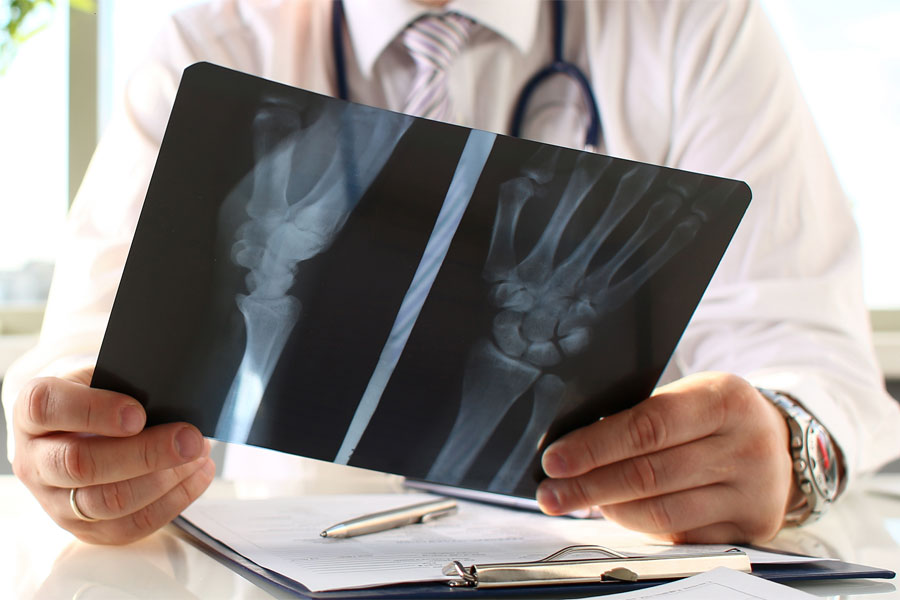Everyday life can include random aches and pains, and perhaps more serious injuries and medical conditions. With the myriad of medical treatment options that exist, how do you know what kind of specialist you need to see? If your chief complaints involve your bones (skeletal system), your joints and/or your muscles, an orthopedic doctor is likely able to provide the medical care you need.
WHAT DO ORTHOPEDIC DOCTORS SPECIALIZE IN?
According to Encyclopedia Brittanica, orthopedic doctors (also spelled orthopaedic) originally treated children with skeletal abnormalities, but now orthopedic doctors also treat broken bones, muscle/tendon/ligament injuries, and degenerative diseases that affect the musculoskeletal system. Orthopedic doctors are also referred to as orthopedic surgeons or orthopedists because most, if not all, orthopedic doctors are qualified to perform surgery.
As technology has advanced, orthopedic doctors have developed treatment methods that are less invasive than the original bulky apparatuses they used. Common orthopedic treatments include: bone grafts, artificial joints and limb replacements, and fitting patients with special braces to correct skeletal structure or allow injuries to heal. Orthopedic doctors utilize knowledge from general and physical medicine, rehabilitation, occupational therapy, and surgery disciplines to inform treatment for their patients.
WHAT CAN ORTHOPEDIC DOCTORS DO?
Orthopedic doctors are experts in treating:
- Fractures and broken bones
- Tumors in the bone or connective tissue
- Sports injuries: These include ankle sprains, knee injuries, dislocated shoulders, muscle cramps/muscle injuries, and shin splints.
- Osteoporosis: A bone condition that can lead to height loss, a hunched back, and can cause fractures as the bone becomes more and more porous.
- Carpal Tunnel: A syndrome caused by repetitive motion, certain illnesses or pregnancy. Symptoms include burning, itching, tingling or numbness from the hand to the shoulder.
And more!
The areas of the body that orthopedic doctors focus on include:
- Hands/wrists
- Feet/ankles
- Spines
- Knees
- Shoulders
- Elbows
- Hips
TYPES OF ORTHOPEDIC TREATMENT
It’s true that there are many forms of treatment for injuries and other musculoskeletal issues that involve surgery, but there are also many out-patient procedures that are non-surgical. As technology continues to improve, treatment options become less and less invasive. Here are some of the more typical non-surgical and surgical procedures that orthopedic doctors utilize:
NON-SURGICAL TREATMENTS
- Braces and casts
- Exercise/Physical therapy
- Injections: Often used for pain management or lubricating joints, orthopedists can inject medicine into the spine or a joint. Injections into the spine can be utilized to diagnose or relieve pain for a variety of conditions. For arthritis or other chronic pain, orthopedic doctors inject hyaluronic acid or steroids into the joint to help lessen the friction between the bones and other parts of the joint.
SURGICAL PROCEDURES
- Amputation
- Arthroscopy: A minor procedure orthopedists use to look inside a joint to see the cartilage and ligaments. Orthopedic doctors use arthroscopy to find inflammation and injuries and also to perform some minor surgeries.
- Cartilage repair: When cartilage is damaged by an injury or trauma to a joint, orthopedic doctors can repair the damage and encourage new cartilage to grow. Most of the time this can be a minor arthroscopic procedure to remove the damaged cartilage and make holes in the nearby bone to stimulate the body’s natural healing response which creates new cartilage.
- Joint replacement: For patients who have joints that have been damaged by arthritis or other conditions, orthopedic surgeons can replace parts of the joint with an artificial device made from metal, plastic or ceramics. Knee and hip replacements are the most common procedures.
SHOULD YOU SEE A PRIMARY CARE DOCTOR OR AN ORTHOPEDIC DOCTOR?
Some people rush to schedule an appointment with their primary care doctor when they have a sprained ankle or another type of injury, but is that the best place to start? Primary care doctors usually have some knowledge about musculoskeletal injuries and other issues, but they are not experts in this area and can’t always provide accurate diagnoses and treatment options.
You may still have to start with your primary care doctor if you’re using an HMO insurance plan, but if you want a second opinion, ask for a referral to an orthopedic doctor so you can ensure you are receiving the best care.
SHOULD YOU SEE A RHEUMATOLOGIST OR AN ORTHOPEDIC DOCTOR?
If you’ve been experiencing pain, stiffness, warmth or swelling in your joins for more than three days or a few times in the same month, it may be time to see a doctor. However, it can be confusing to figure out what kind of doctor to see. Your primary care doctor is a good place to start, especially if you have an HMO insurance plan. If you or your doctor is concerned that you may have arthritis, you should look into seeing a rheumatologist next. Orthopedic doctors are experts in the musculoskeletal system, however, rheumatologists are often more specialized in arthritis.
PEDIATRIC ORTHOPEDIC DOCTORS
The orthopedic field was focused on treating childhood musculoskeletal disorders from the beginning and orthopedic doctors remain experts in this area today. Since children are constantly growing, care providers need to have extensive knowledge of growth plates and how injuries/disorders affect their bones’ abilities to grow properly.
Pediatric orthopedic doctors work with children and families to treat everything from broken bones, cerebral palsy, scoliosis, Marfan syndrome, bowed legs and many other conditions.
DO YOU NEED A REFERRAL?
Patients using an HMO insurance plan will most likely need a referral from their primary care doctor in order to have insurance cover a visit to an orthopedic doctor, since orthopedic doctors are considered specialists. Also, specialists have a higher per-visit cost, which is something to prepare for when you are scheduling a visit to an orthopedic doctor.
MCR HEALTH
Looking for an orthopedic doctor in your area? Here at MCR Health, we can recommend an orthopedic practice for you. Our orthopedic providers specialize in arthroscopy and treating carpal tunnel syndrome, bone and joint injuries, foot and ankle problems, pediatric conditions, and joint fractures. Call and schedule an appointment today so you can be well on your way to healing as soon as possible! We can also get you an appointment with a family doctor if you want to start there.

